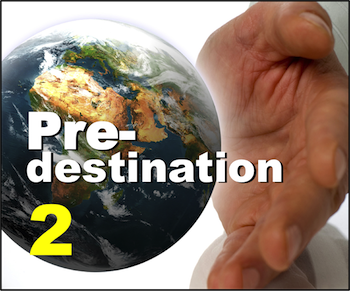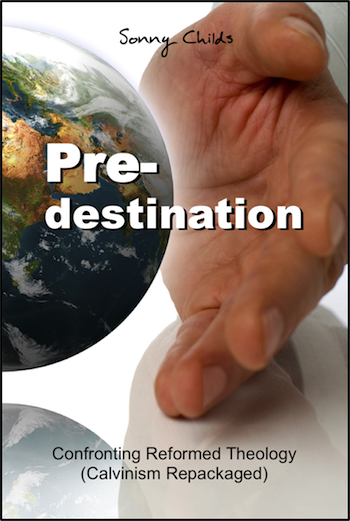Can we impact our own predestination?

Because of the complex nature of predestination and the need to see the harmony of the whole counsel of God, this topic is addressed in four parts:
1. What is the biblical definition of predestination?
2. Can we impact our own predestination?
3. How does predestination impact evangelism?
4. What about Romans 9?
Part 2: Can we impact our own predestination?
In order to answer that question, another question must first be addressed - " Is predestination the goal of God or is it the unchangeable assignment of God?"
Because of the teachings of Calvin and other leaders of the Reformation Movement, it is often assumed that all of God's predestination is unchangeable. But is that so? Consider an interesting passage that not only describes the Holy Spirit's definition of predestination but also the purpose of that predestination.
Acts 17:26-27 (NIV) "From one man he made all the nations, that they should inhabit the whole earth; and he marked out their appointed times in history and the boundaries of their lands. (Predestination, emphasis mine) 27 God did this so that they would seek him and perhaps reach out for him and find him, though he is not far from any one of us." (Purpose of predestination, emphasis mine)
Notice again the words of verse 27, "God did this so that they would seek him and perhaps reach out for him..."
While this passage indicates that God certainly does manipulate certain parts of our existence, ("times," "boundaries") it also indicates that in spite of this predestination and His goal for us to "find him," there is still a responsibility for us to "seek him" and "reach out for him."
Notice a specific example of this found in the life of none other than Jesus Himself.
Q: Was Jesus predestined to die for our sins?
A: Yes! 1 Peter 1:18-21 (NIV) "He was chosen before the creation of the world..."
Q: Did Jesus have the option to change His predestination?
A: Yes! Matthew 26:39 (NIV) Jesus prayed in the garden, "Yet not as I will, but as you will."
Conclusion: Jesus had free will and responsibility in spite of His predestination.
Hebrews 4:15 (NKJV) "For we do not have a High Priest who cannot sympathize with our weaknesses, but was in all points tempted as we are, yet without sin."
The free will choice that Jesus made in the garden (Matthew 26:39) was essential to Him becoming our perfect High Priest (Hebrews 4:15). Without having the potential to impact His own predestination, there would not have been any real temptation, any real sympathy for our weaknesses or any real need for the prayer to be said.
Consider one more insight.
We have all heard the phrase, "Prayer changes things!" But does it really?
James, the brother of Jesus, said this, "The prayer of a righteous person is powerful and effective." (James 5:16, NIV) He then goes on to illustrate that kind of prayer, a prayer that can even impact the timeline of humanity. Elijah's prayer was accepted by God and actually stopped the rain for three and a half years. (James 5:17-18)
Yes, mankind can literally change the mind of God and alter the course of the human timeline through prayer. Why pray if there is no hope of results? Why are we commanded to pray without ceasing if our words are not intended to have impact?
When Calvinism fails to include these examples into its flawed doctrine of predestination, it rejects the whole counsel of God and defaults to a pick and choose approach to Scripture. This is why baptism has been reduced to a post salvation publicity event. When we allow ourselves the right to run through Scripture picking and choosing whatever pleases us without surrendering to the harmony of Scripture, we violate God's sovereignty.
It's not enough to say that God is sovereign and, thereby, claim a superior doctrine. It must actually be so. What if the Bible clearly teaches that, within God's sovereignty, He assigned a limited sovereignty (free will) to us? What if that limited sovereignty actually empowers us to live up to the challenge of being created in His image? To deny our limited sovereignty would actually be a denial of His ultimate sovereignty!
Doctrines that deny free will, deny the most fundamental principle that separates us from all other created beings, we are created in His image.
Conclusion
Yes, we do have the power to impact our own future! The Calvinistic view of predestination removes human responsibility, creates an entitlement culture within Christianity, and profanes the Divine image in which we were created. Beware of Reformed Theology (Calvinism repackaged) and the pretzel-like condition into which it twists Scripture to make the Bible say what Calvin wanted it to say.
Missed part 1 of the study on predestination? Go to:
Part 1: "What is the biblical definition of predestination?"
Want to continue the study of predestination? Go to:
Part 3: "How does predestination impact evangelism?"
Part 4: "What about Romans 9?"
Part 5: "Conclusion"
Back to Top of "Part 2: Can we impact our own predestination?"
Back to The Church Page
Back to Home Page


